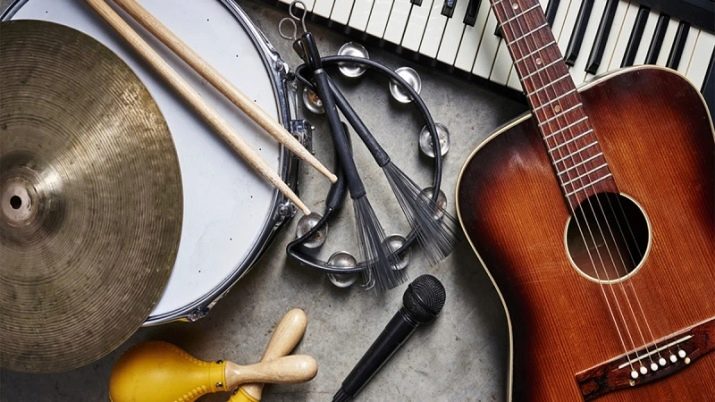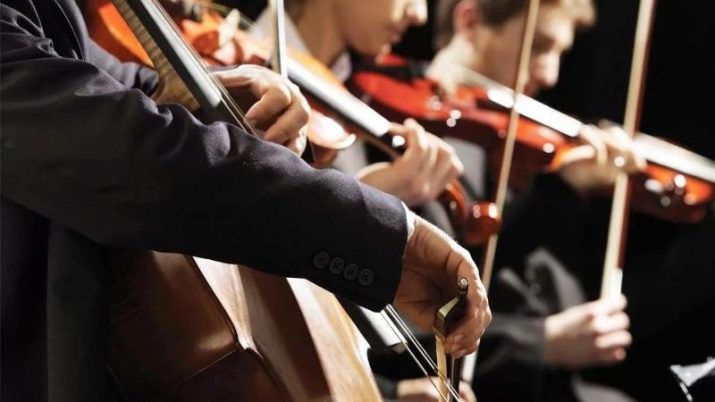Everything you need to know about musicians

It is difficult to imagine life without music - it surrounds a person, penetrates the soul, and has a serious impact on the emotional state of people. Many people believe that it is intended only to brighten up leisure, nevertheless, in most musical compositions there is a meaning and some kind of educational moment.
The work of a musician is multifaceted, and it may seem that it is quite simple - play for yourself in full pleasure. But contrary to popular belief, a person who is professionally engaged in music has to face serious difficulties in the course of building a career.

History
Scientists believe that music originated at the same time as humanity. One of the oldest instruments is the flute, it was found during archaeological excavations near the sculptures, which are 40-45 thousand years old. At the initial stage of the emergence of society, music was more of an applied nature, used for rituals and religious ceremonies. Over time, it became more complicated, and already the ancient Greeks actively used polyphony - only professionally trained musicians could perform compositions at that time.
During excavations in Mesopotamia, the first song recorded on a clay tablet was discovered - it used the third and Pythagorean scale. Obviously, they were composed by a person who was well versed in this matter. In the Middle Ages in Europe, musicians could be found both in the Catholic Church and in secular society. All further history is associated with the active development of music, the emergence of the latest trends, instruments and methods of performance.musical works. During the Enlightenment, people enjoyed classical music represented by instrumental concerts, operas, or symphonies.
Since the twentieth century, other directions have been popularized, such as jazz, rock, rap, soul and many others.

Description of the profession
Many people love music, but not all can be called musicians. In theory, the definition of “musician” can be applied to anyone who makes music, plays an instrument, composes motives, or performs songs. Musicians can be amateurs or professionals. For the first, music is the dictates of the soul, they perform it for themselves or a limited circle of close people, for the second - a source of livelihood.
In modern society, the importance of music is great. On the one hand, any melody is, first of all, entertainment. Today there is no shortage of music programs on radio and TV, and concerts are held in every city. At the same time, music has always fulfilled some educational tasks and contributed to the development of certain ideological attitudes. That is why the profession of a musician is distinguished by heightened responsibility. In fact, in the hands of a professional - a real weapon that can control not only the mood of people, but also their ideas.
A good musician can be called a Teacher - he is listened to, his creations have a powerful effect on the attitudes and minds of people.

Advantages and disadvantages
Like any other profession, the music profession has its merits and demerits. Let's start with the benefits. The most important of them is the widespread demand. Most of the events held necessarily involve musical accompaniment. This means that with a portfolio and experience of performing, regular employment will be guaranteed.
The driving force of creative personalities has always been and remains universal recognition. A person who has achieved success gains popularity, he becomes famous, he has numerous fans and this brings him great inner satisfaction. Interaction with people of similar interests causes no less pleasant emotions. In their circle, he feels comfortable, draws a source of inspiration and exchanges useful experience that he needs for professional development.
Successful musicians regularly go on tour, which can take place in various parts of the world. Thanks to this, they will learn more about life, unusual traditions and customs of other nationalities, get a chance to see different countries and famous architectural monuments with their own eyes. Such an opportunity is unlikely to leave a creative person indifferent.

And, of course, the monetary reward is a very significant advantage. A successful musician can have quite impressive fees, even street performers with a good repertoire, if they have the ability, get a good monthly income., not to mention pop performers, whose incomes are in the hundreds of thousands of rubles.
Despite all the attractiveness and romance of this profession, not every musician becomes popular. The vain attempts of many novice performers to break into the top of the charts quite often lead to depression, long years of training and the search for their viewer seem useless to them. Desperate, such people give up their dreams, give up creativity and lose the meaning of life.
However, and famous people in the music industry have something to worry about too - any glory that comes... To achieve consistently high income, it is not enough to declare yourself well and try to occupy one or another niche on the musical Olympus - the speed with which listeners forget the names of idols is lightning fast. The only thing that can save musicians from oblivion is round-the-clock, hard, exhausting work, constant rehearsals and endless "chasch".
This rhythm of life leaves no room for good rest and proper nutrition, it takes away almost all energy, which has the most unfavorable effect on health.

List of specialties
There are several music specialties.
- Instrumentalist artist. This person is fluent in this or that musical instrument, he is well familiar with all the chords and techniques. His responsibilities include the reproduction of existing compositions. This category includes drummers, pianists, accordionists, guitarists, cellists, and other instrumentalists.
- Vocalists in their work they use their voice to convey the author's musical idea. These people have perfect pitch, they can sing both solo and as part of a group or choir, they perform a cappello music or with musical accompaniment.
- The foundation of musical creativity is composers, they are the ones who compose new pieces of music. If there were no composers, there would be no music and musicians in general.
- Conductors they control the choir or orchestra through the movement of fingers and facial expressions - they dictate to the performers their own vision of the thought that the composer has put into his work.
- Arrangers are engaged in the adaptation of the work to the requirements of modern music trends. They create compositions that may differ slightly from the original version.
- It is impossible not to mention such a category of musicians as music critics... Their tasks include an expert assessment of songs, symphonies, operas and other works, highlighting their strengths and weaknesses. Music critics by their work contribute to the popularization and development of musical trends in society.
- When listing modern types of musical professions, one cannot fail to mention a relatively new specialty - DJ... This category includes creative individuals who are able to create modern compositions using tracks in different styles and complementing them with possible sound effects.
- Music teachers to a certain extent, it can also be attributed to this profession, since it is on them that all the skills, abilities and knowledge that future musicians receive to perform their main activities will depend.


Responsibilities
Due to the fact that the concept of "musician" in itself is rather general, uniting people of different specializations, it is difficult to single out any specific responsibilities that would correspond to all representatives of this profession.
Generally speaking, the tasks of the musicians include:
- creation of new pieces of music;
- performance of music - it can be either the music of your own composition or that of other composers;
- participation in concert programs.
Requirements
Professional skills
In most cases, the requirements for members of the musical profession are determined by their place of work. General professional skills include:
- the presence of musical education;
- well-developed ear for music;
- vocal performance skills;
- possession of musical instruments;
- the ability to compose musical compositions.

Personal qualities
The main quality of any professional musician is talent. Nowadays, it is not uncommon for talented musicians to strive to take the position of a leading instrumentalist or performer, believing that they have all the qualities necessary for this. However, not all of them realize that, first of all, talent should be complemented by the uniqueness of the sound of a voice or instrument - this will help to stand out from a huge number of other performers and declare themselves as a person. This means that for a successful concert activity it is important that a musician has his own individual perception of the world, consisting of bright and colorful pictures of the world that he is able to share.
A musician is an emotional, sensitive person who is prone to empathy. Through music, he can express his personal attitude to a particular situation, tell a fascinating story so that it can evoke the same feelings in the public. Creative people are usually quite unpredictable, so it is difficult to impose any general requirements on them. However, in this profession, persistence, a high degree of organization and determination will help a person to achieve recognition.
Obligatory personal characteristics include the ability to find a common language with people around them, to make contact with them. Musicians must be charismatic - these people are always in sight, watched by spectators and fans, therefore, the ability to present themselves correctly and developed communication skills will make them much closer to the desired success. Another requirement usually placed on musicians is good looks.
Of course, this does not mean at all that the lack of a spectacular appearance will necessarily become a serious obstacle to work, nevertheless, a musician should look neat, neat and stylish.

How to become a musician?
Usually, mastering musical professions takes many years and begins in childhood. Of course, there are exceptions - these include people without special education who begin acquaintance with music at a later age. But, as a rule, there are only a few of them, and only the most gifted of them can count on success. In all other cases, real musicians move from the amateur category to the professional cohort only if they are accompanied by study and hard work throughout their lives.
To become a musician, at a young age, one should enroll in a children's music school or a children's art school. Institutions of the first type specialize exclusively in the musical direction, and in the second, lessons and master classes in dance and theatrical skills are additionally held. Children's musical educational institutions teach playing musical instruments, choral and solo vocals, as well as conducting. Usually, music schools accept children aged 6-7 years, although there are classes for older children. Study lasts from 3 to 8 years, depending on the chosen direction, while, as in a regular school, there are also transfer exams, tests and other tests confirming the acquisition of musical skills. Upon graduation, a young musician is issued a certificate of additional education.
At the next stage of training, future musicians and composers receive secondary specialized education - it can be a music school or an art college. The total period of study is 4 years, upon completion a diploma is issued indicating the qualification awarded. And, finally, the final stage of the entire cycle of education is higher education - musicians receive its future in a conservatory, academy or specialized universities. The program takes about 5 years, after graduation, the musician is considered a professional.

The salary
A musician's salary directly depends on the area in which he works. In fact, there are a lot of places where a representative of the music profession can find employment - from kindergartens to popular musical groups. Another question is that every ambitious performer dreams of giving recitals at large venues.
Most often, musicians are employed in one of the following places:
- musical educational institutions;
- cultural institutions;
- conservatories and theaters;
- film studios;
- restaurants;
- production centers;
- companies in the entertainment industry.
It should be noted that almost all musicians have irregular working hours.For example, performers performing at city venues usually work on weekends and holidays, and their working day often lasts 10 hours, but on weekdays they are practically not involved. Or musical groups performing in clubs and restaurants - their main employment is in the evening and at night, while during the day they have a rest. The period from Friday evening to Sunday is most in demand among them.

There is no definite answer to the question about the salary of musicians. The fact is that nowadays there are, for example, pianists, one of whom can develop 15-20 thousand rubles, and the other - 100 thousand. And the problem in this case is not even that one of them is talented and the other is not; they can be equally professional masters of their craft, just one is a little more fortunate than the other. This is the main difficulty of any music profession - to be in the right place at the right time, to get into the right stream and find your listener. If we talk about the average cohort of musicians who have a permanent job in an entertainment or cultural institution, they earn about 20-30 thousand rubles a month.
When it comes to musicians as representatives of the profession, one cannot ignore those who make money on the city streets. Most often they have a higher musical education, perfect pitch and good performance technique. They were forced to speak on the street by the small salary they receive at their main place of work. As strange as it may sound, most of the musicians who play in transitions earn much more money than, for example, in a conservatory or a small orchestra.
However, and here the spread in wages is great - one musician can earn 100 thousand rubles a month, and another - 3 times less. The total amount is influenced by a huge number of factors. First of all, this is the permeability of the point, as well as the repertoire. If a musician performs in the same place all the time, performing the same music, then these melodies over time "bore" the listeners and this leads to a decrease in income.
According to the observations of psychologists, most often the money is left to musicians by adults with children, after them - by retirees. That is why it is very important for a street musician to choose a place where they will perform, and, of course, smile as often as possible and try to invariably radiate a good mood, charging others with their energy and positive.

Interesting Facts
If it seems to you that you are not doing well with the profession of a musician, then here are three interesting facts.
- The famous Austrian pianist Wittgenstein lost his arm during the First World War. Nevertheless, he was able to return to concert performances and reach the heights of professional skill, performing compositions with one left hand.
- Beethoven did not always feel inspired. Therefore, before starting to compose melodies, he always dipped his head into a vat of ice water - this technique became a habit with him, and the composer could not refuse it until the very last days of his life.
- Once a young man came to the head of the Milan Conservatory and asked to listen to his works. The examiners' verdict was harsh: "You had better give up the thought of music." It was Giuseppe Verdi.
It is noteworthy that several decades later, the same Milan Conservatory sought the right to bear the name of the musician it had rejected.









